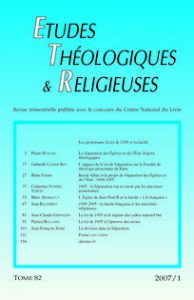Le phénomène sectaire met à l’épreuve la loi de 1905 dont il révèle l’impensé (anciennes évidences culturelles, paris implicites sur l’individualisme, pluralisme et privatisation de la religion). Rappelant que l’État laïc peut se voir contraint de définir la religion et surtout de pratiquer des formes de reconnaissance implicites, Patrice Rolland s’interroge ici sur les conditions d’une régulation du religieux en régime de Séparation.
According to Patrice Rolland, the development of sectarian communities in France puts the 1905 law to the test by highlighting some of its underlying assumptions and values such as ancient cultural beliefs, implicit faith in the virtues of individualism, religious pluralism and privatization of religion. Affecting the reality of the 1905 separation and the way we understand it, sectarianism raises the questions of how cults are to be defined and of what regulation can be implemented within the régime of such separation.
p. 91-101
Auteur
ROLLAND Patrice
Patrice ROLLAND est professeur agrégé de droit public (Paris XII) et membre du Groupe Sociétés, Religions, Laïcité (Umr Cnrs-Ephe).
